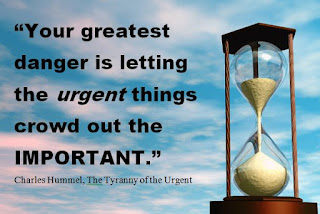 Ever have one of those "ah ha!" moments? I'm a little embarrassed to say that something as obvious as what I'm about to say has only recently dawned on me. But if there is someone else out there who might benefit from this insight, I suppose it is worth the shame.
Ever have one of those "ah ha!" moments? I'm a little embarrassed to say that something as obvious as what I'm about to say has only recently dawned on me. But if there is someone else out there who might benefit from this insight, I suppose it is worth the shame.
For a long time I have been aware of the phrase "The Tyranny of the Urgent." It comes, I discovered, from a book written by the late Charles Hummel. I never read the book. I only knew the phrase, and used it often. I guess I liked the way it sounds: "the tyranny of the urgent!"
In my mind, the phrase stood as a sort of explanation of why it is so hard to get things done, and nothing more. Actually, more than an explanation, I think I viewed it almost as an excuse. Why are my projects and goals so slowly accomplished? Oh yeah, that's right: the tyranny of the urgent.
Maybe it was the word "tyranny" that left me with a sort of fatalistic approach to this idea. If the "urgent" is really a "tyrant" then I had no choice but to do whatever it wanted. Tyranny implied power and strength. Tyranny implied something that could not be escaped. It was inevitable. No sense fighting. The tyrant always wins.
Only recently was I introduced to my mistake. I was listening to an audiobook intended to provide motivation and encouragement. The author then, almost as an aside, happened to say something that grabbed my attention. He said "you must choose the important instead of the urgent."
What? What was that?
The dim bulb began to brighten.
Immediately I looked up the "Tyranny of the Urgent" book online and I found an excerpt with this quote within it:
"Your greatest danger is letting the urgent things crowd out the important."
The "urgent" things only appear to be important because they are sitting right in front of you, shouting for your attention. But they are generally not the important things in life. Important things are what you need to focus on. Important things are what we must give most of our time and energy to. Important things make a difference. Urgent things do not.
So here is what I learned: Your success largely depends on your being able to say "no" to urgent things and to focus more fully on important things.
You must say no to urgent things.
You must say NO to urgent things.
You MUST say NO to urgent things.
Got it?
Stop doing urgent things.
I didn't grasp the fact that you can and should say no to urgent things. I must LEARN to say no to urgent things. They must be dismissed and discarded as quickly as possible, in order to make room for the much less urgent (but vastly more valuable) important things in life.
I'm not sure what the "urgent" things are in your life. I know, for me, it is about 99% of the emails I receive. It is often about 50% to 75% of what I do with my spare time. I have a long way to go to fully implement this principle. But I feel like I now get it. And I guess that's a good start.